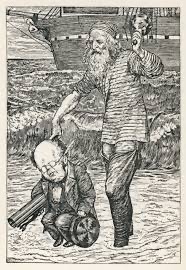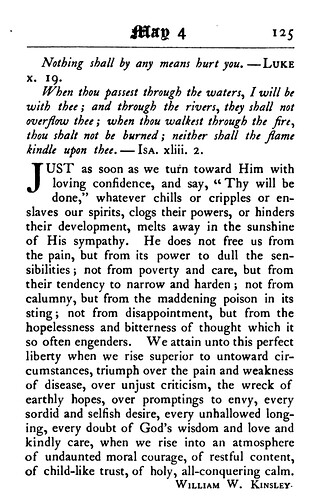No offense intended but I almost never read these sorts of pamphlet-like meme-ish things unless they have a riveting visual and topic. So I missed your craftsmanly snark.

?
![]()
Intriguing but mostly weird?
That was probably too abstruse. Try this: WikiQuote
Not, to the latter. (Our posts were almost next to each other in different fibers of the fiber optics, yours arriving sooner than mine by nanoseconds.)
(Note the camera icon in Google’s search field. You can save an image to your device and then upload and search on it.)
From The Jabberwalkies song, I’m guessing.
It’s its own thing.
A variety of videos, from minutes to over an hour:
The Hunting of the Snark.
145 pages into *Fear and Trembling, in the last paragraph of the main text, I found one of the things I’d waited about 123 pages to find:
But there was no one who could understand Abraham. And yet, what did he achieve? — that he remained true to his love. But the person who loves God has no need of tears, no admiration — in love, he forgets the suffering; indeed, so completely has he forgotten it that afterward there would not be the least hint of pain if God himself did not remember it, for he sees in secret, and knows the distress, and counts the tears, and forgets nothing.
So, either there exists a paradox, that the single individual, as the single individual, stands in an absolute relation to the absolute, or Abraham is lost.
—Søren Kierkegaard, Fear and Trembling, (Kirmmse translation) p. 145.
- No wonder. He was a Danish Christian, in Denmark, the state religion of which was The Evangelical Lutheran Church in Denmark. Today’s demographics say 75% of Denmark are members of the ELC in Denmark.
- Promising future for Christianity in a country where some portion of the population longs for a “state approved” religion.
- “Kierkegaard’s theology focuses on the single individual in relation to a known God based on a subjective truth. Many of his writings were a directed assault against all of Christendom, Christianity as a political and social entity. His target was the Danish State Church, which represented Christendom in Denmark. Christendom, in Kierkegaard’s view, made individuals lazy in their religion. Many of the citizens were officially “Christians”, without having any idea of what it meant to be a Christian. Kierkegaard attempted to awaken Christians to the need for unconditional religious commitment.” [Source: Theology of Søren Kierkegaard]
Yeah. I’ve only read a few of his very short pieces referred to in The Essential Kierkegaard as the “Faedrelandet Articles”. They are scathing for exactly the reasons you mention. In those he focuses as well on the corrupting affect of money on the church, from the very beginning of the sincere seminarian’s studies, to his job search, to all the “service fees” the church will charge through him for normal Christian events like baptism, marriage, and funerals. Much of his conclusion in those pieces is that the state church exists to perpetuate itself.
His Attack on Christendom, at least the anthologized abridgement I will try to get to soon after I’m done trying to process Fear and Trembling. If I ever manage that.
Certainly, in such an situation, I can understand Kierkegaard’s disgust. Although, even among the less circumspect (although his critique is that there are none of these), and also among less intellectually astute Danish Christians, I think he would find some, who exhibited a genuine faith, even if they couldn’t formulate it in hegelian terms (the single individual as the single individual in absolute relation to the absolute). [Thanks to @Jay313 for helping me understand that forumlation.]
SK does give a bit of credit here:
In our times, how many understand what the absurd [faith] is? In our times, how many people live in such a way that they have renounced everything or have gained everything? How many are even honest enough to know what they are capable of and what they are not capable of? And isn’t it true that insofar as there are such people, they are more likely to be found among the less cultivated and among women?
(F&T, p. 122)
Could you unpack “hegelian terms” a little more for me as you began to there in the parenthetical followup I guess? I know I’ve looked up Hegel before to try to appreciate what he was about, but for some reason his impact on philosophy is still a large region of ignorance for me. And maybe I should just search back into Jay’s stuff that you mention to see if that would turn on some lightbulbs for me too. But I wasn’t sure where or how far up that was if it’s in this thread.
Please hold. Give me a couple of minutes. You don’t need to look anything up — yet.
Fear and Trembling, the only entire piece of work I’ve read by Kierkegaard, is in part a reaction against Danish Christians, who were attempting to combine Christianity with Hegelian philosophy. I have only touched on Hegel’s ideas indirectly in history classes and then read enough about them in Kierkegaard: A Very Short Introduction to have a basic grasp of that aspect of F&T. My understanding of Hegel is Pre-K.
However, I can say a few things. Hegel’s work had dismantled Christianity, all religious systems really, and then because his system required some basis for morality, he posited a of god and a strange system of spirituality. Kierkegaard saw this as a problematic combination.
From a basic grasp of Communism, you probably understand the idea of the “universal” that Kierkegaard talks about. It’s the society to which any of us belongs, and into which we are required (according to Hegel) to annul our individuality for the sake of the universal. [Elise is talking to me as I write, about the little girl in the red coat in Schindler’s List, who is a perfect example of “the single individual as the single individual.” As Schindler was watching masses of people being brutalized, that one little girl stood out — Spielberg must have read F&T.] In Communism the individual is not of interest, neither are individual posessions, etc. The universal is the thing. Asserting one’s individuality in such a system is immoral. And any god concept is one of a universal, impersonal diety. Faith in such a diety is simply a recognition of it as part of the universal; there is no direct relationship to it. It is not “absolute” in that it cannot be accessed except within the universal, which is always mediated, so no direct unmediated access is possible. (obviously this is unacceptable to Kierkegaard.)
All of this is important in F&T, particularly in Kierkegaard’s forumlaic description of Abraham’s faith as “the single individual as the single individual, higher than the universal, in absolute relation to the absolute.” Over and over and over. Do I have it memorized yet?
Kierkegaard’s conception of faith is that it involves a single person acting individually, that is outside of the universal, and often in conflict with universal morals, that is ethics. Abraham is the most jarring example of how faith and ethics can be entirely at odds. The command to kill Isaac is either an act of relgious devotion, or an act of murder. The acts are irreconcilable.
The act of faith occurs between an individual person and God with nothing in between. In order for this to occur, it must take place outside of the universal. In Hegel’s system, as I understand it, the universal is the highest telos for a person. It doesn’t get any better or higher. But there is no way for the act of faith as Kierkegaard undrestands, to take place within the universal, so faith must take place outside the universal, and even higher than the universal.
By acting in faith, an individual removes her or himself from the univeral to be in direct relation God. This puts the person in conflict with the universal, even before the specific task of faith is in question. This is the ultimate gamble. If faith is misplaced or the task of faith is falsly understood, the person has made her or himself an outcast.
I hadn’t intended to write an article! Sorry Merv. I hope I got it all in there. Ask away.
Wow! And many thanks indeed for all of this which is connecting for me better than before - you’re a good teacher for me.
So it sounds like the Hegelian ‘universal’ is something like our Anabaptist emphasis on community, only with Hegel, it ran amok to an extreme and got secularized along the way? I mean … our religious version of that is that nobody should try to be a Christian in isolation and that we always need community for accountability, growth, and support. But Hegel’s version of it brings to mind something more like storm troopers of empire or a Nazi state (or Marxist - so I guess he was big time Hegelian, right?). Definitely sounds dystopian. Gotta run myself for a task today, but I’ll be back to see whatever other discussion has unfolded here.
Interesting point. Re “community”: (and yes, thanks @Kendel for the great summary of Hegel and SK above which helped clarify some things for me too).
Anabaptists historically made a point of separating from the State, (the first reformers to do so), stressing that there were two “communities”–the New Kingdom of believers, where one becomes a member by choice (through faith) and demonstrated through (adult) baptism, and the secular state community into which one is naturally born. They did not recognize “Christendom” as a valid “Christian” community. So I wonder if SK’s criticism of “following the communities ethics” derives from him being immersed in the Christendom of his day, Christendom which naturally conflates the whole community as being “faithful Christians”.
In the mind of Anabaptists, one doesn’t have to posit Nazis to see the danger of following the ethics of the the crowd, they were skeptical of the regular “secular crowd”, pointing out that commonly accepted ethics (defend the honour of your King and State with force) fall short of Jesus’s counter-cultural ethics via the Sermon on the Mount.
Yes! Thanks for that clarification. Those dystopian architypes that always get brought up (by people like me) sort of function as our cultural bellwethers if we sense that a logical extension of certain attitudes or policies, taken to an extreme are going to lead us to …
But no society starts out in such a state, and seems to be brought to those dark places by fear-fueled reaction against other things.
This is why I just couldn’t bring any interest to reading Marx in the one course on European Intellectual history I took which covered that period. @Mervin_Bitikofer’s post today in the MacDonald thread really drives home how there is no access to the universal (meaning the divine, not the state) except through the individual. And that seems to have been SK’s thought too in regard to poor Abe.


